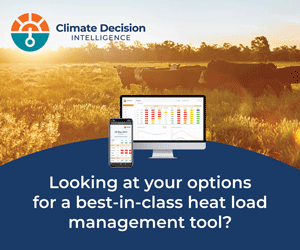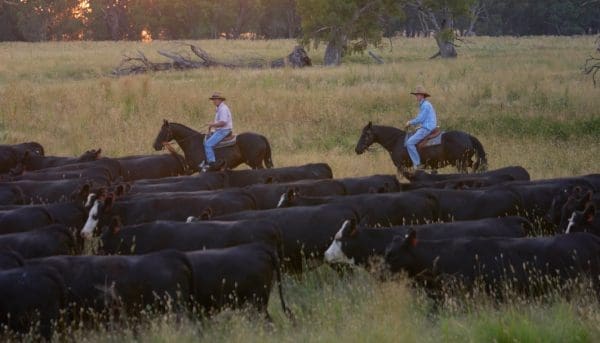COMPANIES setting emissions targets are hoping to add a new commodity to the carbon market – getting producers to keep carbon credits in the meat supply chain.
AgCarbon Central has been taking a deep dive into the trend of insetting, explaining what it is and how the trend has come about. Producer and AgForce Young Producers’ Council chair James Henderson has also offered his perspective on insetting, arguing it could de-value the work needed to sequester carbon, and suggesting a re-think of company targets.
While the debate over the targets will no doubt continue, some retailers, processors and food service companies are looking to to establish a pathway to meeting their carbon neutral targets without purchasing offset credits from outside the supply chain.
Dr Francois Visser runs a company called Carbon Friendly, not to be confused with carbon aggregator Climate Friendly. Dr Visser is helping some of the cattle industry’s biggest customers develop ways of “insetting” to help companies differentiate their products that have a lower carbon footprint.
 “There is a new set of demands that are now being introduced that are not necessarily consumer-based, they are more corporate-based and reputational-based form key players in the supply chain,” he said.
“There is a new set of demands that are now being introduced that are not necessarily consumer-based, they are more corporate-based and reputational-based form key players in the supply chain,” he said.
“That is a good thing for producers, because reduction claims have to be met and for these companies, their supply chains are their biggest problems – one supermarket told us that its supply chain made up 90pc of its total emissions.
“By en large they can only be neutral if their supply chain is neutral and going forward with the carbon insets that farmers can generate, they may well be in high demand by the supply chains. The focus is to reduce Scope 1 and 2 emissions (direct emissions, under control by producers) and improve carbon sinks on-farm to deliver a lower net emissions product to the downstream beef chain – therefore minimising or neutralising the Scope 3 emissions burden from the purchased cattle, feed, transports etc.”
Carbon Friendly has developed a certification program and a digital platform whereby one can quantify and track the emissions from producers, feedlots, processors and distributors throughout the whole supply chain. The outcomes need to be in alignment with the ISO 14064-2 (2019) standard and third party audited.
“This provides full transparency and integrity of data and verification, as the evidence required for any product differentiation and reduction targets,” Dr Visser said.
“With insetting the aim is to do an annual review and determine both value propositions: how many kg’s of live weight gain has been produced, and how how many kg’s of carbon has been sequestered due to the manner in which the production system was managed.
“If you have Australian Carbon Credit Units, they are attached to the farm and the farm sells the credits, whereas with insetting the carbon credits are attached to the beef when it is sold, mainly to offset the emissions of the supply chain.”
ACCUs not involved in Carbon Friendly
The Australian Government has its own carbon neutral certification scheme called Climate Active, which Coles used to release its carbon neutral beef brand last year. Any emissions that need to be offset under Climate Active are often done by purchasing ACCUs, which is what Coles did.
However, Carbon Friendly is also allowing farmers to register projects under carbon programs outside the ACCU scheme, namely Verra. Dr Visser said it is an integrated method that considers the whole farming operation rather than a single activity.
“It may be an expensive pathway for producers to pass ACCUs forward through the supply chain for supermarkets or processors to become carbon neutral,” he said.
“If retailers and brands are only going to rely on ACCUs to offset their supply chains, they may be limiting the scope of their supply of credits due to the competition for such offsets from large emitters.”
Who will pay for the credits?
Purchasing offsets from outside the supply chain is not allowed under the Science-Based Targets Initiative (SBTi)– which AgCarbon Central wrote about last week. It requires all carbon reduction to come from within the supply chain.
Asked about who will pay for inset credits, Dr Visser said there was strong demand from global brands who have signed up to SBTi.
“Purchasing offsets for products to become carbon neutral is becoming frowned upon, and it appears such product claims may be banned the UK in future.
“It appears there is another carbon customer in the chain now, it is not just the carbon conscious consumer, and it seems these major brands and retailers may have to rely on these inset credits from farmers to reach their reduction targets.
“The exchange of these insets is not limited to direct partners in the supply chain, and there is talk of textile companies that may pay cotton farmers for their inset credits to offset their entire supply chains.”
Dr Visser said the inset credits are likely to remain in demand for a long-time.
“We believe these reduction credits are going to be in short supply, and there will never be enough of them for all supply chains to be neutral




HAVE YOUR SAY